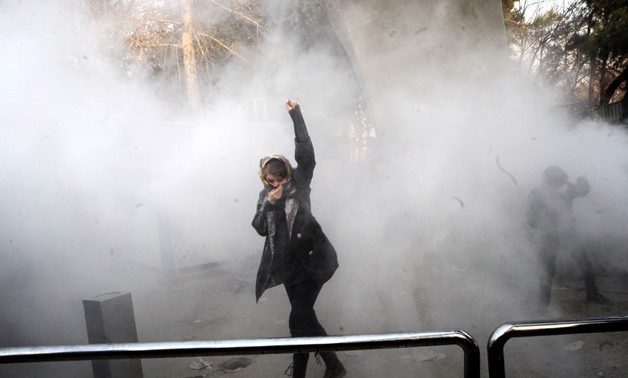
An Iranian woman raises her fist amid the smoke of tear gas at the University of Tehran during a protest driven by anger over economic problems, in the capital Tehran on December 30, 2017. – AFP
CAIRO – 3 December 2018: Several parliamentarians closely agreed that Iran’s role in the Middle East regain will decline in conjunction with the escalating demonstrations against the current regime.
They added in statements to Egypt Today on Thursday that what is happening in Tehran will affect the region in a direct way, “several scenarios could be expected; however, they will be more concerned with their internal affairs.”
Parliamentarian Saad al-Gamaal affirmed that Iran’s dangerous role in the region will be restricted and declined, along with all of the parties and countries it supports, including the houthis in Yemen.
He added that the Iranian demands are normal and fair, especially that they are seeing all of their money directed to mysterious parties and entities outside the country, “meanwhile, they are in deep need for many things, including good living standards and jobs.”
Member of Parliament Kamal Amer said that the entire world, and especially the Arab countries including Saudi Arabia and Egypt, is closely watching the escalating events; however, he added that the upcoming scenario is being watched out for. “It’s either a revolution, or several demonstrations could be controlled,” Amer said.
He explained that the Arab countries’ reaction will take place according to the development of the events.
“It’s too early to say that we could expect what will happen inside Tehran; we are waiting to see how Hassan Rouhani’s regime will react to his nation. He might implement new economic reforms and respond to some of the demands, and he might not,” said Tarek Fahmy, a political science professor at Cairo University.
Furthermore, Fahmy added that maybe within one week, everything could change. “We can’t do anything but wait and see,” he said.
Iran has been witnessing an uprising since Thursday, December 28. Demonstrators chanted slogans against Rouhani and Ayatollah Ali Khamenei, including “Death to Rouhani, Death to dictator.”
In several following tweets, the American president Donald Trump had been supporting the Iranian uprising. “The entire world understands that the good people of Iran want change, and, other than the vast military power of the United States, that Iran’s people are what their leaders fear the most.... Oppressive regimes cannot endure forever, and the day will come when the Iranian people will face a choice. The world is watching!” Trump wrote on his twitter account on December 30.
Later on December 2, Trump criticized Barak Obama for dealing with Rouhani’s regime, describing him as a “foal.”
“The people of Iran are finally acting against the brutal and corrupt Iranian regime. All of the money that President Obama so foolishly gave them went into terrorism and into their ‘pockets.’ The people have little food, big inflation and no human rights. The U.S. is watching!” He wrote.
In response, Rouhani expressed his anger of the Trump administration’s stance. In a short speech on Sunday, December 31, he said, “those who described Iranians as terrorists cannot stand in solidarity with them now.”


Comments
Leave a Comment